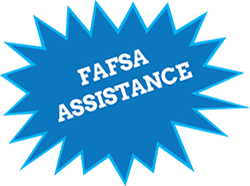Welcome to Financial Aid & Military/Veteran Services

What is Financial Aid?
Financial aid is money from federal, state and institutional sources intended to help students with college expenses. We are committed to providing information about financial aid processes and resources so students may pursue educational and career goals at MCC.
**Notice from Department of Education**
The updates to the 2024-45 FAFSA have caused a delay in the Department of Education's processing of the Free Application for Federal Student Aid (FAFSA). 2024-25 FAFSA student information will not be available to schools to review or make financial aid offers until mid-March 2024. If you have any questions, please email Financial Aid at FinancialAid@mccneb.edu.
There are generally five types of financial aid:
- GRANTS: Most grants are sources of financial aid which generally do not have to be repaid as long as you complete your classes. Grants can come from the federal government, your state government, your college, or a private or nonprofit organization. Do your research and be sure to meet application deadlines!
- WORK-STUDY: The Federal Work-Study program provides part-time hourly employment for students who demonstrate financial need as determined by the FAFSA. See MCC’s Federal Work-Study opportunities
- SCHOLARSHIPS: Scholarships are funds provided to students who meet certain criteria or achieve certain academic merits. Most scholarships are provided to students for specific school-related items, such as tuition or books. Some scholarships are can be refunded after school expenses are covered. More information about MCC Scholarships
- STUDENT LOANS: A federal student loan is money borrowed from the federal government to help pay for education expenses, and the funds must be repaid with interest. Borrowing loans should be a last option, and MCC encourages students to exhaust all other types of financial aid first. More information about Federal Student Loan Programs
- MILITARY & VETERANS EDUCATION BENEFITS: If you have service-related education benefits, please click here for more information about military and veteran education benefits. We recommend you connect with a VA School Certifying Official (SCO) at South Omaha Campus.
Estimated Cost of Attendance (COA)
Cost of Attendance (COA) is an ‘estimated’ amount for tuition & fees; books, course materials, supplies, and equipment; cost of living expenses; transportation expenses; and some other reasonable miscellaneous expenses. Actual costs will vary depending on enrollment hours, student dependency status, personal spending habits, and other variables. A student’s financial aid budget is intended reflect minimal costs incurred by the student while attending MCC.
COA is used to calculate a student's eligibility for financial aid, including the Federal Pell Grant, Federal Student Loan Programs, Federal Supplemental Educational Opportunity Grant (FSEOG), Nebraska Opportunity Grant (NSG), Federal Work-Study (FWS) and Board of Governors Tuition Grant (BGTG). More information about Cost of Attendance